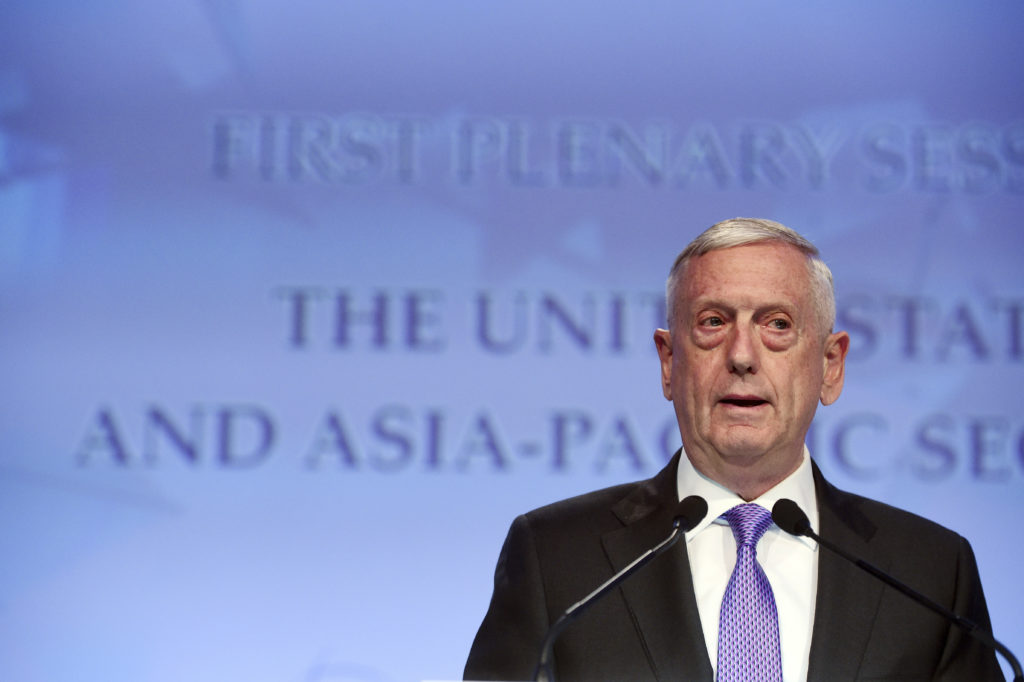US Defense chief criticizes China on South China Sea

U.S. Defense Secretary Jim Mattis gives a speech about “The United States and Asia-Pacific Security” at the first plenary session at the 2017 International Institute for Strategic Studies (IISS) Shangri-la Dialogue, an annual defense and security forum in Asia, Saturday, June 3, 2017 in Singapore. AP
SINGAPORE—Pentagon chief Jim Mattis said Saturday that North Korea posed a global threat and praised China’s efforts to influence Pyongyang, while also criticizing Beijing over its continued “militarization” of the South China Sea.
President Donald Trump — who frequently denounced China on the campaign trail — has turned to Beijing to help rein in North Korea’s weapons program, prompting concerns among Asian allies that America might go easy on the South China Sea issue.
Calling North Korea’s nuclear ambitions a “threat to us all,” Mattis said the international community must work together.
“It is therefore imperative that we do our part each of us to fulfill our obligations and work together to support our shared goal of denuclearization on the Korean Peninsula,” Mattis said in a policy speech at the Shangri-La defense summit in Singapore.
Pyongyang on Monday test-fired another rocket, the latest in a series of launches and atomic tests that have ratcheted up tensions over its quest to develop weapons capable of hitting the United States — something President Donald Trump has said “won’t happen”.
Article continues after this advertisement“The Trump administration is encouraged by China’s renewed commitment to work with the international community toward denuclearization,” Mattis said.
Article continues after this advertisementREAD: US envoy: US believes China is trying to stop North Korea tests
The defense chief spoke directly to concerns that America might grant concessions to China in order to ensure its cooperation on North Korea, saying the issue was not “binary” and that the United States would continue to pressure Beijing elsewhere.
“The scope and effect of China’s construction activities in the South China Sea differ from those of other countries in several key ways,” Mattis said.
“This includes the nature of its militarization… China’s disregard for international law … (and) its contempt for other nations’ interests.”
READ: Who’s going to stand up to China’s bullying?
The US Navy on May 25 conducted a “freedom of navigation” operation in the South China Sea, when the USS Dewey guided-missile destroyer sailed within 12 nautical miles of Mischief Reef in the Spratly Islands.
China claims nearly all of the South China Sea, despite partial counter-claims from Taiwan and several southeast Asian nations including the Philippines, Brunei, Malaysia and Vietnam.
It has rapidly built reefs into artificial islands capable of hosting military planes.
‘Enduring commitment’
Japanese Defense Minister Tomomi Inada meanwhile told the conference that North Korea has improved its ability to operate its ballistic missile forces and warned that the threats it posed to the region and the world “have now entered a new stage”.
“I urge North Korea to abandon its nuclear and ballistic missile programs in a complete, verifiable and irreversible manner. North Korea must cease its provocative actions and abide by its international obligations and commitments,” she said.
After meeting with President Xi Jinping in April, Trump, who once accused China of “raping” the US, praised its leader as a “good man”, saying it would be inappropriate to pressure Beijing while Washington is seeking its help with Pyongyang.
The posture shifts have left some in the region seeking clarity on US policy.
Mattis told the summit that America maintains an “enduring commitment” to the region.
International pressure ramped up on Pyongyang Friday as the UN Security Council imposed sanctions on 18 North Korean officials and entities.
The council unanimously adopted a US-drafted resolution that put North Korea’s suspected spy chief, 13 other officials and four entities on the UN sanctions blacklist, hitting them with a global travel ban and an assets freeze.
“Beyond diplomatic and financial consequences, the United States remains prepared to counteract North Korean aggression through other means, if necessary,” US Ambassador Nikki Haley told the council.